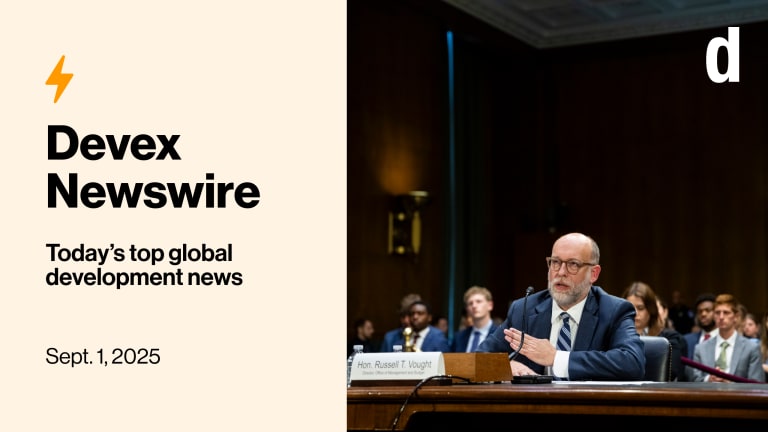
Humanitarian assistance is failing to meet the COVID-19 moment.
Join us: At 9 a.m. ET (3 p.m. CET), listen in to our virtual event on the future of AI in health tech — and how LMICs can invest in it. Save your spot here.
The U.K. government’s aid cuts have taken a toll on the entire humanitarian system, and other donors have struggled to pick up the slack. During a year when needs were higher than ever, international humanitarian assistance stayed flat at $30.9 billion in 2020, according to this year’s Global Humanitarian Assistance Report, released Tuesday by Development Initiatives.
• While the two largest donors — the U.S. and Germany — increased their contributions in 2020, these failed to offset reductions in funding from 7 of the 20 largest donors. The U.K. government slashed its assistance by nearly one-third, and Saudi Arabia cut its contribution by more than half.
This is a preview of Newswire
Sign up to this newsletter for an inside look at the biggest stories in global development, in your inbox daily.
• COVID-19 funding appears to have come at the expense of other humanitarian needs. While additional funding for the pandemic drove up several donors’ overall contributions, assistance for non-pandemic crises decreased.
• Humanitarian appeals were only 52% funded in 2020, a record shortfall of $18.8 billion.
What happens next? This snapshot of a broken funding system arrives as humanitarian leaders plot the next phase of the “Grand Bargain” aid reform agenda. “With little prospect of humanitarian need reducing, accelerating the pace of long-called-for reform within the humanitarian system is critical,” the report reads.
Read: Donor cuts slashed humanitarian aid in 2020, despite increased need
Be the change
What does it take for a crisis to bring about change? According to Stephanie Draper, chief executive at Bond, three things: 1) there must be demand for change before the crisis; 2) the crisis must reveal new ways of doing things; and 3) there must be willingness to cement those changes when the crisis ends.
“Across the international development sector, we have all of those three in spades,” Draper tells Will Worley in this Devex Pro discussion on “The post-pandemic NGO.”
Watch: How the past year will shape NGOs of the future
Gas exchange
The World Bank’s new Climate Change Action Plan, released officially on Tuesday, is intended to help countries shift from green projects to green economies, Genevieve Connors, who oversees tracking and reporting on climate finance at the bank, tells Shabtai Gold.
The plan lifts the bank’s climate finance target from 28% of its portfolio to 35% for 2021-2025. It also commits the institution to aligning its operations with the goals of the Paris Climate Agreement — though the bank isn’t planning to unveil exactly what that means until COP 26 in November.
Climate activists continue to criticize the bank for what they view as “loopholes” in its fossil fuel policies. While the bank ended support for coal over a decade ago, and upstream oil and gas projects more recently, its willingness to entertain natural gas as a “bridge” to cleaner energy sources continues to draw environmentalists’ ire.
Read: World Bank boosts climate funding, but activists fret over gas deals
+ For more content like this, sign up for Devex Invested, the weekly newsletter on how business, social enterprise, and development finance leaders are tackling global challenges.
Backsliding
A report published today by the Independent Commission for Aid Impact, a public body that monitors U.K. aid spending, described its interactions with the Foreign, Commonwealth & Development Office as “challenging” at times. Will reports that U.K. aid experts fear the transition to FCDO has resulted in a less transparent and less responsive development institution.
Read: Transparency and openness have fallen at FCDO, says UK aid watchdog
Deadline pressure
Aid groups are warning that if the U.N. resolution authorizing cross-border humanitarian assistance for Syria is not reauthorized, they will not be able to deliver the range and scale of services required. The current resolution expires July 10. Linda Thomas-Greenfield, the U.S. Ambassador to the United Nations, has made cross-border aid a top priority in the first months of her tenure.
ICYMI: Aid groups urge UN to reauthorize Syria crossings as deadline looms
Law and roller blades
“When we skate, we’re in control and we keep a strong grip on our weapons.”
— Syeda Aiman, counterterrorism officer, Pakistan's Sindh PoliceCounterterrorism police in Karachi, Pakistan have an image problem. The solution, apparently? Roller blades.
In other news
Suspected Taliban fighters fired a rocket into a hospital in Afghanistan on Wednesday, sparking a blaze that caused extensive damage and destroyed COVID-19 vaccines. [Reuters]
Médecins Sans Frontières has suspended its activities in two overcrowded detention centers in Tripoli due to increased violence toward migrants and refugees by Libyan authorities. [AP]
The World Food Programme warns that 41 million people in 43 countries are at imminent risk of famine, with nearly 600,000 already experiencing famine-like conditions. [Al Jazeera]
Gabon has become the first African nation to receive a financial reward for protecting its forests as part of international efforts to fight climate change. [BBC]
Sign up to Newswire for an inside look at the biggest stories in global development.








